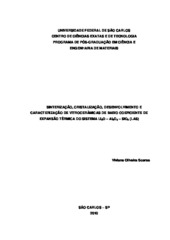Sinterização, cristalização, desenvolvimento e caracterização de vitrocerâmicas de baixo coeficiente de expansão térmica do sistema Li2O - Al2O3 SiO2 (LAS)
Resumo
Glass-ceramics based on the Li2O-Al2O3-SiO2 (LAS) system represent the most important (commercial) family. They are required for applications where extreme dimensional stability and thermal shock resistance are of utmost importance. Glass-ceramics are mainly produced by the traditional method of melting and shaping followed by internal crystallization induced by nucleating agents and thermal treatments. In this work an alternative route to obtain glassceramics in the LAS system was developed by sintering with concurrent crystallization. Very low thermal expansion coefficient (TEC), good mechanical strength and nil porosity were the intended properties. Several glass compositions in this system were formulated and evaluated. The samples were characterized by optical and electrical microscopy, X-ray diffraction and dilatometry. The optimized glass-ceramic composition presented 1.4% of residual pore fraction and thermal expansion coefficient of 0.02 x 10-6 ºC-1 between 40C and 500C. The Clusters model was used to simulate its sintering process and good agreement with experimental data was achieved. Excellent thermal shock resistance up to 600C and a flexural strength similar to that of the commercial glass-ceramic Ceranwere obtained. In order to minimize the residual porosity and improve the superficial properties of the sintered LAS glass-ceramic, silica and silica/zirconia coatings obtained by solgel route were deposited by dip coating on the glass-ceramic surface. The silica/zirconia coating (TMZ), which was only 0,4 m thick, was the hardest one and exhibited the highest wear resistance. The sintered glass-ceramic here developed showed similar dimensional stability and mechanical properties to the commercial material Ceran, which indicate its potential application, for example, as cook top panels. viii
